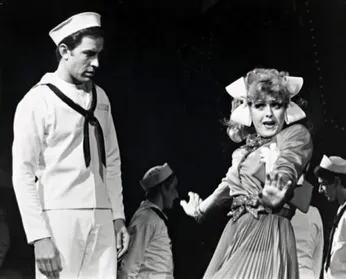
Source: Michael Blanchard/BSO
December 31, 2024
Through the Years with Bernadette Peters
Robert Nesti READ TIME: 15 MIN.
When Bernadette Peters first appeared with the Boston Pops under John Williams in 1991, she sang Stephen Sondheim's "Broadway Baby" – a title that neatly describes this incandescent star. She was not quite born in a trunk, having started performing at the age of 3 thanks to her stage mother who kept her child busy in a number of early television quiz shows throughout the 1950s such as "The Horn and Hardart Children's Hour" and "Juvenile Jury." At 9 she received her Equity card appearing in a flopola play called "This is Goggle" that closed out-of-town. Years later she would remember her first quote from a reviewer covering that show: "She has a rear end like a Bartlett pear, and she comes on stage like a grade school Diamond Lil," a reference to Mae West, to whom she was sometimes compared as an adult.
At 15 she toured in the second national company of "Gypsy." That was 1963. Some 40 years later she would helm that musical's fourth Broadway revival and receive her seventh Tony nomination for a performance. She won the Best Actress in a Musical Tony twice – for "Song and Dance" (1986) and the 1999 revival of "Annie Get Your Gun," again repeating a role made famous by Ethel Merman. She was also honored with the prestigious Isabelle Stevenson Tony Award in 2012, in part for her philanthropic work with Broadway Barks, the organization she founded 25 years ago with her friend Mary Tyler Moore to promote rescue dog adoptions. And Peters could conceivably receive another nomination this season when she returns to Broadway this Spring with "Old Friends," a celebration of Sondheim's career she starred in last year in London.
Theater, film, and television are mediums that Peters has excelled in, but what could be the best showcase for her multi-faceted talents is the concert stage, where the actress/singer makes a deep, often electric connection with her audience; and not through histrionics, but the care she gives each lyric, especially those of Sondheim. There was a debate back in the day as to how Sondheim preferred actors who sing to those that put the voice first; but with Peters there is no such concern. He put it this way: "Like very few others, she sings and acts at the same time. Most performers act and then sing, act and then sing ... Bernadette is flawless as far as I'm concerned. I can't think of anything negative."
Watch Bernadette Peters sing "Broadway Baby" with John Williams and the Boston Pops.
Boston audiences will get a special New Year's Eve treat on Tuesday when Peters returns to Symphony Hall for her 11th appearance with the Pops, on this occasion with her musical director Joseph Thalken conducting the orchestra for her portion of the concert. To check on the availability of remaining tickets, click here.
In any of her recent concert appearances – last August in London where she played at the Theatre Royal Drury Lane and in October in New York when she returned to Carnegie Hall for the first time in 30 years – she was said to be in terrific form. And while the world has changed many times over since her first appearance with the Pops, she appears not to have. At 76, she looks many years younger having maintained what critic Stephen Holden described as her cupid-bow lips, piles of frizzy curls and Vargas girl figure. The reference to legendary artist Alberto Vargas is no accident. For the cover of her first solo album in 1980, she went to the artist to persuade him to paint the album's cover art. The 84-year-old looked at her and said, "You ARE a Vargas girl," and painted the cover.
Nor has her voice – a distinctive, husky soprano – dimmed, whether belting out a show-stopper like "Some People" or all but whispering "Send in the Clowns." Put simply, she has panache – that unique blend of charisma, talent, wit, intelligence, humanity, and just plain-old show biz savvy that few performers possess, nevermind maintain for six decades. When film director James Ivory was casting "Slaves of New York," an adaptation of Tama Janowitz's stories set in the 1980s, he auditioned numerous actresses to play the film's lead, "but out of 100 girls, there was not a single one with Miss Peters's originality."
It was her uniqueness that made her a star when she appeared in "Dames at Sea," a gentle satire of Ruby Keeler-Busby Berkeley Depression-era musicals that led many to compare her to Betty Boop, the delightful, saucy cartoon character from that period. Since getting the original cast album of that show, Peters has been a constant in my life and I've seen her numerous times in five-plus decades. Here are some of the most memorable moments:
On The Town (1971)

There were two revelations when seeing Ron Fields' revival of "On the Town" when it had its tryout at the Shubert Theatre in Boston in the fall of 1971. The first was the great whoosh of Bernstein's score filling the theater – a mix of boogie-woogie, Broadway, and classical modernism. The second was Peters, who played Hildy, the men-hungry taxi driver, who all but kidnaps an unassuming sailor who only wants to go sightseeing while she has more intimate things on her mind; and she was hilarious – sublimely over-the-top, yet just right. Theater historian Ethan Mordden wrote: "Peters scored the first big win of so far short but busy career. Driving aa tiny, campy taxicab around the stage in her launching scene and then taking over the place for a major 'I Can Cook, Too,' Peters caught the essence of 'On The Town's' New York." With terrific dancing, a strong cast, dreamy sets, imaginative period costumes (co-designed by Bob Mackie), and, of course, Bernstein's remarkable score, how could it go wrong? It did, closing in three months. Critics gave it the bums rush – even knocking Bernstein, but not Peters. "Best of all is Bernadette Peters as the Bronxly nasal taxi driver, who wants to go to her place and has a heart as big as the Stage Door Canteen. Miss Peters sings, acts and dances, in that order, with a saucer eyed naughtiness and wide vowelled drawl that is totally enchanting," wrote Clive Barnes in the New York Times. The show closed in December, but the following May, Peters received her first Tony nomination.
Pennies From Heaven (1981)
Watch Bernadette Peters in "Pennies from Heaven."
Sometime after the failure of "Mack and Mabel," (where she introduced the the torchy "Time Heals Everything" with heartbreaking intensity), Peters relocated to Los Angeles and became one of the decade's most reliable comedic actresses in such titles as Mel Brooks' "Silent Movie," John Huston's "Annie," and Carl Reiner's "The Jerk," where she starred opposite Steve Martin, her boyfriend at the time. But her greatest acting triumph was a musical in which she didn't sing a note, "Pennies from Heaven." The film, directed by Herbert Ross, again paired Peters with Martin, but in a much different mode than their previous work. Dennis Potter adapted his screenplay from his hit British television series set in the 1930s that told a downbeat story of a dreamy sheet music salesman who cheats on his wife, gets a schoolteacher pregnant, abandons her, and is executed for a murder he didn't commit. Not quite "Annie." As is standard in musicals, the characters break into song to express their emotions; except Potter used a device where the actors lip-synched to recordings of period songs. When Peters as the schoolteacher-turned-prostitute sings "Love Is Good for Anything That Ails You," it is not her voice, rather that of little-known voice actress Ida Sue Mccune, who recorded the song with an arrangement by Billy May. Porter is ideally cast, having the range to go from the sweetly innocent young woman Martin picks up in a music store to the sexy vamp singing "I Want to be Bad" to the original 1920s recording by Helen Kane. The big-budgeted film brilliantly contrasted the drab poverty of Depression-era America with flashy musical numbers in the style of lavish musical films from the period; but audiences didn't relate to its dark vision and it failed big time at the box office. Still, critic Pauline Kael raved: "'Pennies from Heaven' is the most emotional movie musical I have ever seen." And of Martin and Peters, who dare to climb onto the screen and mimic the iconic Fred Astaire/Ginger Rogers number "Let's Face the Music and Dance," she added: "The star, Steve Martin, doesn't flatter the audience for being hip; he gives an almost incredibly controlled performance, and Bernadette Peters is mysteriously right in every nuance."
Sunday in the Park with George (1984)
Watch Mandy Patinkin and Bernadette Peters in "Sunday in the Park with George"
"Connect, George, Connect," says George, the great grandson of impressionist master George Seurat, who is in the midst of a spiritual crisis in the second act of "Sunday in the Park with George," Sondheim's first collaboration with writer/director James Lapine, which arrived on Broadway in 1984. Who did connect with palpable chemistry were Mandy Patinkin and Peters, each masterfully playing two different characters from two different centuries in this visionary musical. I was fortunate enough to watch it develop over its gestation period during its previews. Early on, the walk-outs were frequent, but this unusual show steadily found its groove and audience, in part to the extraordinary recreation of Seurat's masterpiece, "A Sunday Afternoon on the Island of La Grande Jatte," that ends its first act. But as the show headed towards opening, it became apparent to Sondheim and Lapine that the second act wasn't gelling. It was Sondheim to the rescue. Just days before the critics came, two new songs were added – "Children and Art" for Peters, who played George's 98-year-old grandmother; and "Lesson #8" for Patinkin. Suddenly the show's emotional arc fell beautifully into place. With "Children and Art," Marie's soliloquy, Sondheim brilliantly condensed the show's complex themes into a simple lullaby that was performed by Peters in a frail whisper. Earlier in the first act, she played Seurat's mistress Dot, corseted and complaining in the show's tongue-twisting title number; coquettish when dressing in "Color and Light;" ruefully comic in "Everybody Loves Louis;" and simply heartbreaking in "We Do Not Belong Together." But nothing tops the final duet with Patinkin, the anthemic "Move On" that leads into the final tableaux of the painting. They were magical, and in "Sunday," Peters was a great singing actress in a great singing role.
Slaves of New York (1989)
Watch this clip from "Slaves of New York"
One of Peters most remarkable qualities is how easily she can move from period roles to contemporary ones. Such was the case in 1989 when after "Into the Woods," she was cast in "Slaves of New York," an adaptation of Tama Janowitz's short story collection by the esteemed team of director James Ivory and producer Ismael Merchant. In the mid-1980s, they had defined the successful art film with their adaptations of E.M. Forster ("A Room with a View" and "Maurice") and Henry James ("The Bostonians"), and many felt "Slaves" was outside their artistic milieu, though they had previously worked on contemporary films set in New York.
Janowitz's screenplay centered on Eleanor, played by Peters, a hat designer stuck in a dysfunctional relationship with Stash, a trendy East Village artist. Due to the tight real estate market, Eleanor lives with him in his apartment, which makes her a slave because she can't afford to move out. She puts up with his constant barrage of verbal abuse with painful vulnerability; until she gets the confidence to move on. In many ways, Eleanor is a spiritual cousin to "Sunday's" Dot, living with an artist who doesn't appreciate her and finding the confidence to find their own way. Peters great warmth and vulnerability made Eleanor endearing, but not to critics at the time, including Roger Ebert who wrote in his half-star review: "I detest 'Slaves of New York' so much that I distrust my own opinion. Maybe it's not simply a bad movie. Maybe it takes some kind of special knack, some species of sly genius, to make me react so strongly." Janowitz later joked: "I brought down the house of Merchant-Ivory."
The film was far from perfect, but didn't deserve the drumming it received, and since then it has become a cult classic, if only for its depiction of the East Village art scene with sleek galleries sitting among Alphabet City's bombed-out buildings; as well its outre fashions, that include the hats that Eleanor designed, including one resembling an ashtray with a lit cigarette. And a fur coat that she receives as a gift made of some sort of synthetic fur that could ignite if too close to a light source. Seen today, "Slaves of New York" is fun ride that has the authenticity of a time capsule. And contains an iconic queer moment when three drag queens, dressed in matching red gowns that the Supremes might have worn back in the day, who parade down the street singing "Love is Like an Itching in My Heart." The moment capsulized living in New York City in the 1980s where such a treat felt commonplace.
Gypsy (2003)
Watch Bernadette Peters sing "Rose's Turn" at the 2003 Tony Awards.
In 2003, Peters took on the Mother Courage of musical roles – Rose in "Gypsy," apparently encouraged by the show's librettist Arthur Laurents and lyricist Stephen Sondheim in a new staging by the British director Sam Mendes, who took a stripped-down, Brechtian approach to the backstage story of a children's act struggling during the last days of vaudeville. But even before previews began, some in the press attacked Peters as being wrong for the role; then supposedly at the first preview Laurents confronted Mendes claiming he had ruined his musical. Making matters worse, Peters struggled with a cold that caused her to miss preview performances, which only fed more ugly rumors.
The show's troubles were such news that New York Times critic Ben Brantley spent half of his opening night review recounting them, with the other half raving about how Peters overcame adversity and gave a complex, nuanced performance. "Don't listen to the vultures," he wrote. When I saw the show late in its run, the Peters was in fine voice and played Rose with a fragile exterior that hid her steely center. She was a sexy Rose, and a believable one. When it all fell apart in "Rose's Turn," it was shattering. But don't take my word for it – watch her appearance on the Tony Awards that year to promote the show with "Rose's Turn," which a Tumblr account called "theater ramblings" described as "one of the most indelibly resonant and frequently re-referenced solo performances at the awards show just before she lost – defying detractors to comprehend how she could be unworthy of the accolade with a rendition of 'Rose's Turn' that has apocryphally earned one of the longest standing ovations seen after such a performance even to date."
Bernadette Peters with the Boston Pops (2019)
Watch Bernadette Peters perform "Let Me Entertain You" from the opening night of the Boston Pops 2015 season.
Peters most recent appearance with the orchestra came in 2019 when she opened the Pops 2019 season. At the time, I wrote: "an iridescent, silver lilac dress that clung to every curve, Peters looks like she hasn't missed a spin class in years; and that unmistakable honey-soaked belt, which has served her well since she first appeared off-Broadway in late 1960s, showed little wear. Her voice, combined with her superb acting skills, made for a remarkable set." In her set, she mixed Broadway standards, such as the opening "There is Nothing Like A Dame" (which she comically bumped-and-grinded through, to songs from "Hello, Dolly!,"which she starred in after Bette Midler and her first replacement, Donna Murphy, left the show. She also put her sultry spin on Peggy Lee's "Fever." The rest of the program were, of course, from Stephen Sondheim, and included an incredibly poignant "In Buddy Eyes," which offered a glimpse of how she played the role of Sally in the 2011 revival; the always pertinent "No One Is Alone," which she didn't get to introduce in "Into the Woods;" a stirring "Being Alive" (from "Company"); and a quietly rendered "Send in the Clowns," again proving that there isn't a better interpreter of his songs than she is.
Robert Nesti can be reached at [email protected].







